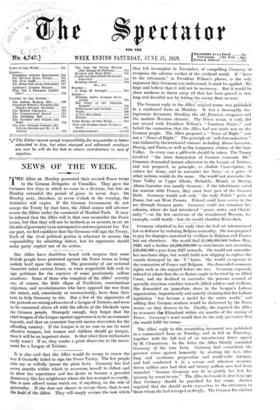Germany admitted in her reply that she had set international
law at defiance by violating Belgian neutrality. She was prepared to pay for damages sustained by civilians in Belgium and France but not elsewhere. She would find £1,000,000,000 before May, 1926, and a further £4,000,000,000 in instalments not exceeding £50,000,000 a year from 1927 onwards. She would not surrender her merchant ships, but would build new shipping to replace the vessels destroyed by the ' '-boats. She would co-operate in the restoration of France and Belgium. She demandNI economic rights such as she enjoyed before the war. Germany expressly refused to admit that the ex-Kaiser ought to be tried by an Allied Court, and she declined to surrender the persona accused of specially atrocious cruelties towards Allied soldiers and civilians. She demanded an immediate share in the League's Labour organization, impertinently and untruly claiming that her Labour legislation " has become a model for the entire world," and adding that German workers would be distressed by the Peace terms—as they deserve to be. Finally, she required the Allies to evacuate the Rhineland within six months of the signing of Peace. Germany's word would then be the only guarantee that she would-fulfil the terms.






































